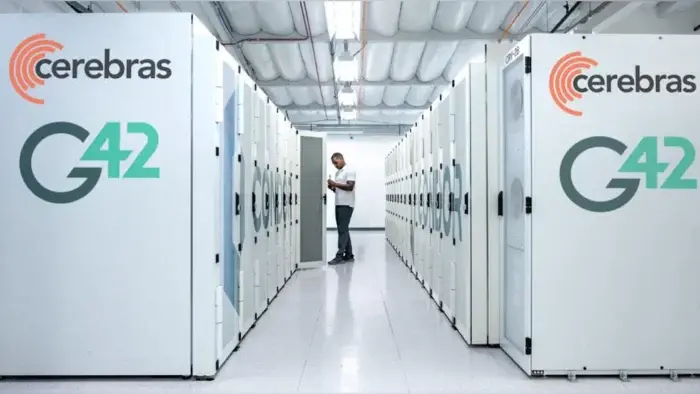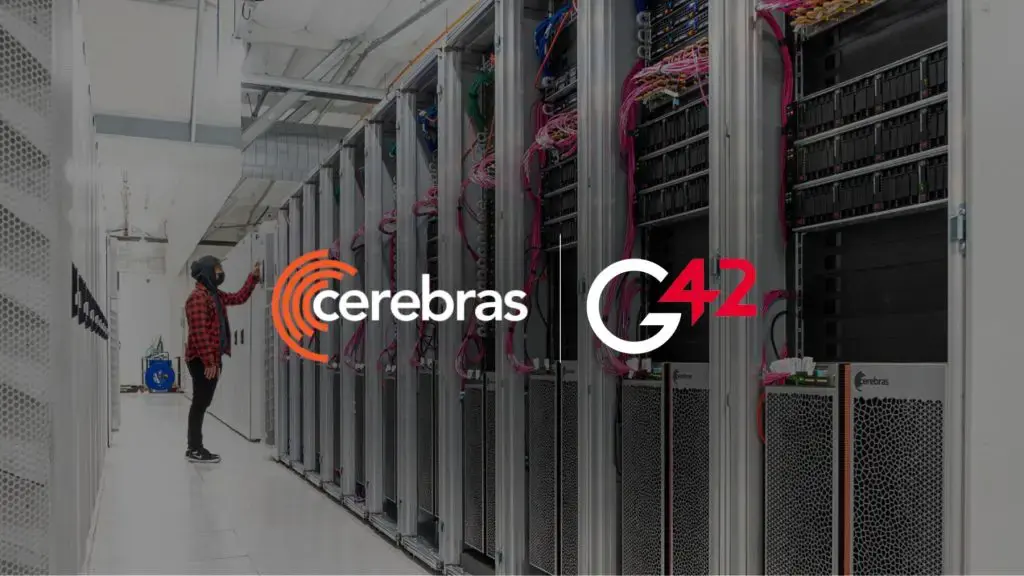The U.S. government has expressed concerns about G42, a technology holding company in the United Arab Emirates. This company, overseen by Sheikh Tahnoon bin Zayed, is constructing a network of powerful AI supercomputers. The U.S. is worried because G42 has ties to Chinese firms like Huawei, which they consider to be security threats.
Understanding G42 – A Tech Holding Company
G42 plans to use CS-2 hardware from Cerebras, a company that recently criticized Nvidia for supplying AI and high-performance computing GPUs to Chinese companies. Cerebras’ WSE-2 processors are notably the largest chips ever brought to market. These chips pack 2.6 trillion transistors and 850,000 AI-optimized cores. All of these are on a single wafer-sized 7nm processor. These processors are part of the CS-2 systems.
G42 is working on several Condor Galaxy supercomputers for AI, using the Cerebras CS-2 systems. One of these supercomputers, CG-1 in Santa Clara, California, can be able to deliver four FP16 Exaflops of performance for large language models. It can handle up to 600 billion parameters and has the potential to expand its capabilities to support models with up to 100 trillion parameters.
Why the U.S Government is Concerned about G42’2 Relationship with China
The U.S. government is particularly concerned because, despite being a U.S. firm, CG-1 is just the initial A.I. supercomputer in a series of three (CG-1, CG-2, and CG-3), all relying on Cerebras hardware. Adding to the unease, G42 and Cerebras have intentions to introduce six Condor Galaxy supercomputers globally, each capable of four Exaflops. It is this extensive network of powerful machines that has raised suspicions from entities like the CIA.
Under CEO Peng Xiao’s leadership, G42 has expanded through notable agreements. They include a partnership with AstraZeneca and a $100 million collaboration with Cerebras to build the ‘world’s largest supercomputer.’ Despite these ventures, classified CIA reports express concerns about G42’s involvement with Chinese companies, especially Huawei, citing potential national security risks. The worry is that G42 could serve as a conduit for sensitive American technologies and genetic data.
U.S Government Threatens to Sanction G42 if it Continues Working with China 
While the CIA’s stance on Xiao is unclear, discussions between the U.S. administration and UAE officials have taken place. The U.S. has started urging G42 to distance itself from Chinese entities. It has even hinted at potential sanctions if the association persists. The physical location of these supercomputers outside the U.S., coupled with their high performance, raises fears that they could be used to train large language models for Chinese interests. This places G42 amid the escalating tensions between the U.S. and China.
Notably, G42 is a crucial element in the UAE’s economic diversification strategy. The company moves beyond oil dependence. Strengthening ties with China and Russia, the UAE aims to reduce reliance on the U.S.
G42 declined to comment on its Chinese partnerships and U.S. concerns. However, a senior executive emphasized the company’s global tech collaborations. This includes talks with Microsoft. It has also reassured commitment to U.S. regulations, ongoing discussions with U.S. agencies, and responsible A.I. development partnerships.
Conclusion
The US government is concerned about G42’s relationship with China. This is because the company has ties to Chinese firms like Huawei, which they consider to be security threats. G42 is working on a network of powerful AI supercomputers. These supercomputers could be used to train large language models for Chinese interests. The US has urged G42 to distance itself from Chinese entities and has even hinted at potential sanctions if the association persists. G42 has declined to comment on its Chinese partnerships and US concerns, but a senior executive has emphasized the company’s global tech collaborations and commitment to US regulations.






